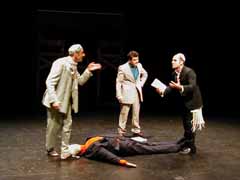
A Muslim, a Christian and a Jew Meet in the Desert.
No, It's Not a Joke
 |
| Mario Bassil, Jacques Maroun and Elie Karam in "The Middle Beast" at La MaMa E.T.C. |
"The Middle Beast"
Directed by Joe Kodeih
La MaMa E.T.C. (Annex Theater)
74A East Fourth Street
Th-Sat at 7:30 p.m., Sun at 2:30 p.m. and 7:30 p.m.
$20; Box Office (212) 475-7710. Online ticketing available at www.lamama.org
Reviewed by Paulanne Simmons Oct. 11, 2003
For many people, the Middle East is the land of miracles. Certainly Lebanese co-authors Elie Karam, Joe Kodeih (who also directs) and Marc Kodeih have created their own miracle, or at least something quite extraordinary - a play that deals with the Israeli/Palestinian conflict and is also at times truly hilarious.
"The Middle Beast," at La MaMa Experimental Theater Club, is about three men, a Muslim (Mario Bassil), a Jew (Elie Karam) and a Christian (Jacques Maroun), who are about to close on a deal over a piece of land when a corpse drops out of the sky. Each of the men interprets this strange apparition in his own way.
"I'm sure the corpse is stuffed with explosives," says the Jew. "One of your spying corpses," the Muslim responds. "Let's put our differences aside and try to find a solution," the Christian begs.
The only voice of reason is that of a young woman (Taranasha Wallace) who tells the unseen presence whose instructions she appears to be following, "They're speaking the same language, but it seems different."
The characters jeer at each other throughout the play. The Jew and the Muslim argue over who has the bigger nose. Sometimes they gang up against the Christian. They laugh at his unclean habit of eating pig and the possibility that he may not be circumcised. The Christian counters by telling the Muslim that at least he does not first wipe his ass with his hand and then eat with it.
At the same time none of the characters are spared by the playwright. The Jew believes the body is a fiddler who has fallen from the roof. He suspects he himself may be the Messiah.
The Muslim cannot stop himself from praying loudly and disturbing his neighbors, who are praying more quietly. When the picture of a pretty young woman is found on the body he grabs it and begins handling his private parts in a less than innocent manner.
The Christian is mostly concerned with his commission and is largely ineffective in mediating the dispute.
And in a truly wonderful episode, the three men examine the body to see if the dead man had been circumcised. A process proceeded by a good deal of hesitation but accompanied with a good deal of salacious joking.
The direction of "The Middle Beast" is brilliant, as is the dialogue. Kodeih keeps the scenes moving at a leisurely pace, giving his actors ample time to develop their characters both physically and verbally.
He presents the play on a stage that is bare except for the structure on which the woman resides. He sets the mood with Oriental-Cuban jazz music from the latest CD of Lebanese composer Michel Elefteriades, who remixed traditional Lebanese traditional songs; mystic oriental music by Lebanese composer Same Hawatt; and an excerpt from "The Peace Song," by Shawn Philips.
The three men in "The Middle Beast" live in three different worlds. The Muslim and Jew's mistrust is so great that each refuses to precede the other when walking off with the Christian. They also describe the death of a Muslim woman in totally different terms - ironically, while the Christian sleeps. In fact, the only thing the three men can agree on is how to roll hashish into a cigarette.
Yet each man is positive he knows exactly what God wants. Although one suspects God may only want them to stop fighting.
But despite the tragic misunderstandings, there's something definitely vaudevillian about the three male actors. At times their verbal assaults remind one of the Marx brothers, while their physicality is more like the Three Stooges. Bassil is a particularly talented clown.
The director has noted the title of the play is inspired by "the name of the region where the three protagonists of the play come from. This region has been, since ages, the theater of many conflicts and bloodshed, as if the Beast of the Apocalypse doesn't want to leave its inhabitants in peace. The three religions that are meant to be peaceful and who are based on peace, serve the warlords as a pretext to rule and install their social ideologies."
The vision expressed in The Middle Beast is certainly not optimistic. One feels that, despite the three men's desire to avoid some awful outcome, their fate has been inexorably sealed by their own righteous stubbornness.
The only hope offered by "The Middle Beast" is that
perhaps those who see the play will see the foolishness of continuing on
the same murderous path and, if possible, do something about it. That may
be the best reason for seeing "The Middle Beast". The other reason
is that, from beginning to end, it's pure entertainment. [Simmons]

| museums | NYTW mail | recordings | coupons | publications | classified |